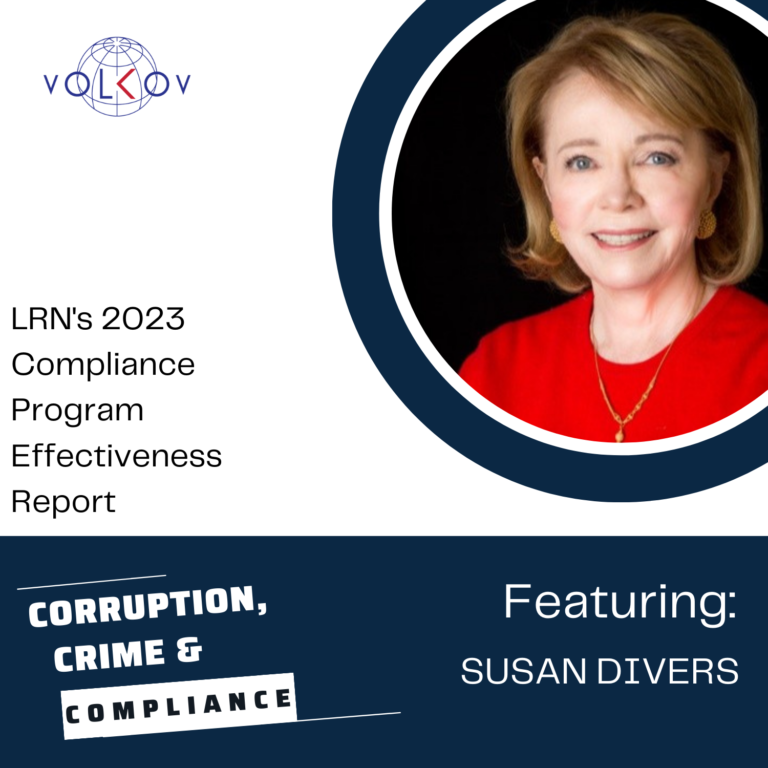Is your company’s compliance program truly effective, or is it just ticking boxes? In this episode of Corruption, Crime, and Compliance, Michael Volkov dives deep into LRN’s PEI survey with Susan Divers. Susan sheds light on the global nature of ethics and compliance programs, challenging the misconception that they are solely US-centric. They discuss the power of values, the shift from a cop to a coach approach, and the revolutionary trends in employee-centric training, especially in the age of remote work.
Susan Divers is the Director of Thought, Leadership, and Best Practices at LRN. She has a wealth of experience as a former Chief Compliance Officer, and her emphasis on values over rules in compliance programs has made her a trailblazer in the industry.
You’ll hear Michael and Susan discuss:
- The LRN PEI survey challenges the perception that ethics and compliance are US-centric; many programs worldwide share common features such as codes of conduct, training policies, and audits.
- Examining a decade of data, the report delves into how ethics and compliance programs responded to the disruptions caused by the pandemic.
- LRN’s data reinforces the idea that ethics and compliance programs relying on values and ethical cultures are more effective than those solely based on rules. Shifting from a cop approach to a coach approach enhances program effectiveness.
- Ethical companies experience lower employee misconduct rates, higher employee satisfaction and productivity, and achieve greater sustainable financial performance.
- The pandemic prompted a shift in focus from content-driven training to employee-centric, relevant, and mobile-friendly modules. Shorter modules, just-in-time training, and tailored approaches are emerging as best practices.
- Ensuring accessibility through web-based policies and procedures, coupled with interactive capabilities and data analytics, becomes crucial in bridging the gap between remote workers and compliance initiatives.
- Gathering data on employee interactions provides insights into the effectiveness of compliance programs. Metrics such as completion times, pass rates, and group performance allow for targeted efforts to enhance the program’s impact.
- Michael emphasizes the challenge for compliance officers in handling the plethora of available data. Choosing the right metrics, setting standards, and ensuring the usability of metrics over time are crucial considerations.
- The report highlights that high-performing ethics and compliance programs are integral to the decision-making processes of companies. 70% of respondents reported modifying or abandoning a business initiative due to an ethics and compliance risk assessment.
- Susan introduces the concept of embedding a short Ethical Culture survey at the end of training courses. This real-time survey, known as the Ethical Pulse Culture survey, serves as a powerful tool to gauge and improve the ethical culture within organizations.
- The Ethical Pulse Culture survey becomes a game-changer, operationalizing compliance by offering a moving average of data insights. This survey, incorporated into scorecards, provides business managers with valuable insights into their business unit’s ethical culture over time.
KEY QUOTES
“… if you have to make a tough decision and you come down on the side of your values, then your [compliance] program is working.” – Susan Divers
“If you’re relying on rules, almost inevitably you’re incentivizing people to game the rules. … So the more companies really realize that and move from a cop approach to a coach approach, the more effective their programs are going to be.” – Susan Divers
“The research shows that asking people to answer ethical questions after they’ve taken training is much more effective and accurate than doing it separately. And what we’re seeing with our clients that are doing that is a 95%, sometimes 97% participation rate … And the other advantage of this is it’s a moving average, it’s not a one and done. But they were able to show over time how that particular business unit is doing… and they’re allowing their business managers or their business unit heads to see that data. This is another example of operationalizing compliance.” – Susan Divers
Resources



